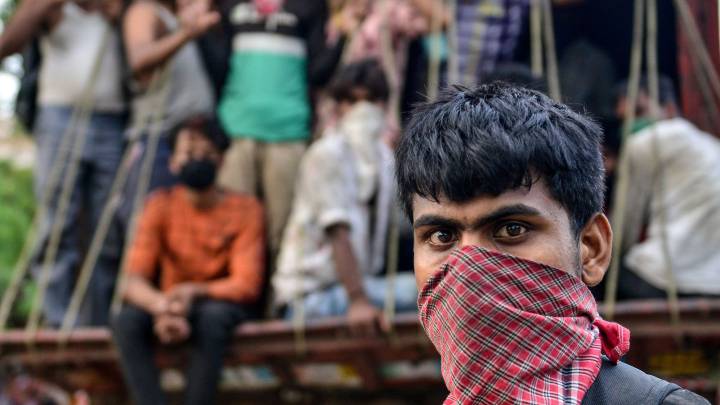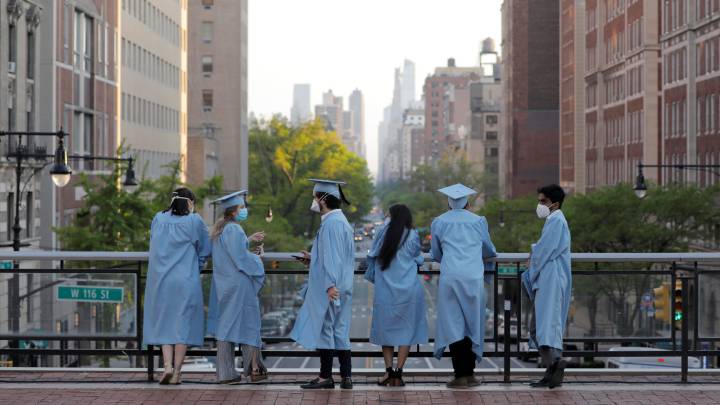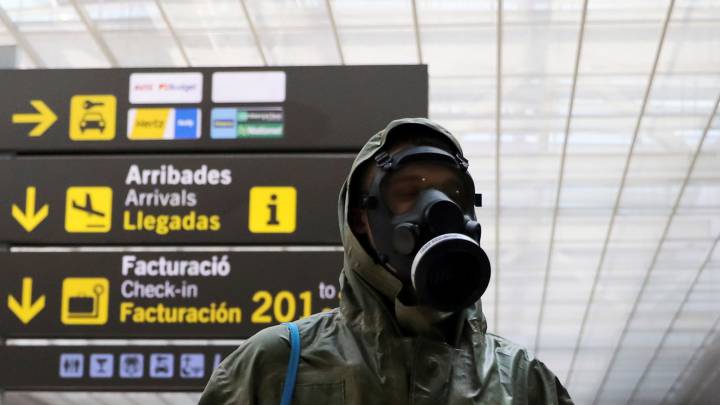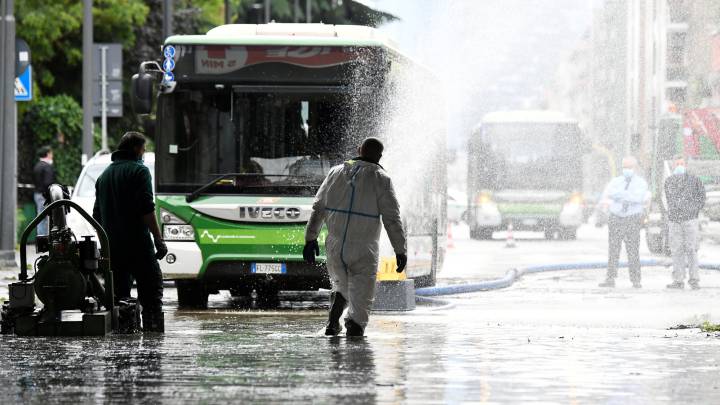Coronavirus summary: deaths, cases, news - 15 May
Coverage of the Covid-19 pandemic around the globe: breaking news, comments and statistics as they emerged throughout 15 May 2020.

Show key events only
Coronavirus live global updates: cases, deaths and news - 15 May
Global totals and country news
Confirmed worldwide cases: 4.5 million +
Confirmed worldwide deaths: 307k +
(Source: Johns Hopkins University)
A pause...
We're going to take a break from our live coronavirus coverage for a few hours, but we'll be back before you know it to bring you the latest developments in the crisis as they emerge throughout Saturday. Many thanks for reading.
Brazil health minister quits
Brazilian health minister Nelson Teich has resigned after less than a month in the post as a result of disagreements with the country’s president, Jair Bolsonaro, over the handling of the coronavirus crisis in the South American nation.
Teich had been critical of a decree issued by Bolsonaro permitting businesses such as hair salons and gyms to reopen, while Reuters reports that the president's insistence that the minister endorse the anti-malarial drug hydroxychloroquine was a major factor in his resignation.

It's a dog's life
Dogs' ability to sniff out whether people are infected withCovid-19 will be put to the test by British researchers, in a bid to develop a fast, non-invasive means of detecting the disease.
Britain's government said on Saturday it had given 500,000 pounds towards the research, which will be conducted by the London School of Hygiene and Tropical Medicine, Durham University and a British charity, Medical Detection Dogs. "Bio-detection dogs already detect specific cancers and we believe this innovation might provide speedy results as part of our wider testing strategy," innovation minister James Bethell said.
Six dogs - labradors and cocker spaniels - will be given samples of the odour of Covid-19 patients from London hospitals, and taught to distinguish their smell from that of people who are not infected. Medical Detection Dogs said it had previously trained dogs to detect certain cancers, Parkinson's disease and malaria. If successful, an individual dog could check up to 250 people an hour and be used in public spaces and at airports. Similar experiments are being run in France.

Robot car gives children virtual tour of Chiba Zoo in Tokyo
Children who are feeling a bit restless while in quarantine in Japan can go on a virtual tour of the zoo thanks to the RakuRo autonomous self-driving robot. The vehicle, developed by ZMP Inc. is fitted with a 360-degree camera which filmed the animals at Chiba Zoological Park, Tokyo. Video is streamed in real time so that children can take a virtual tour of the zoo from their computers at home.
China admits destroying early coronavirus samples
China has admitted that it destroyed some samples of the coronavirus in the early stages of the outbreak, but refuted US allegations that their actions were part of a cover-up.
Liu Dengfeng, a supervisor at the science and education division of China's National Health Commission, said at a news conference on Friday in Beijing that the Chinese government issued an order on 3 January to dispose of coronavirus samples at certain facilities not qualified to handle such highly infectious diseases as a measure to "prevent the risk to laboratory biological safety and prevent secondary disasters caused by unidentified pathogens."
Defending Beijing's approach, Liu said that Chinese public health laws clearly stipulate that institutions not meeting the requirements to handle such samples must either transfer them to a qualified depositary for safekeeping or destroy them.
PM's claims he ordered early lockdown at UK care homes refuted
Prime Minister Boris Johnson told Britain’s parliament on Wednesday that his government moved swiftly to protect the country’s vulnerable care homes. Under increasing pressure to defend his record on fighting Covid-19, he said: “We brought in the lockdown in care homes ahead of the general lockdown.”
However, an investigation by Reuters into the guidance issued to care homes, as well as interviews with three care home providers, has provided no evidence that any such early lockdown was ordered.
The prime minister’s spokesman told reporters that in his comments earlier that day to parliament, Johnson was referring to government advice to care homes, issued on 13 March. This advice, he said, was “recommending essential visits only, that obviously came before we took steps nationwide in relation to social distancing.” The government issued a general lockdown order to the nation on 23 March.
European supercomputers used to research Covid-19 hacked
Supercomputers in Switzerland, Germany, and the United Kingdom being used to research Covid-19 were hacked this week, Bloomberg reports.
Supercomputers can assist in researching Covid-19 and other viruses by running simulations to study the disease’s effect on cells and to gain further insight on potential treatments.
Pretty Things vocalist Phil May passes away
It's been a terrible couple of months for music fans, with the passing of Bill Withers, Hamilton Bohannon, Florian Schneider, Dave Greenfield, Millie... On Friday, it was announced that Phil May, singer with 60s band The Pretty Things had passed away following complications after hip surgery. He was 75.
Portugal to reopen beaches next month
Portugal will reopen its beaches on 6 June, prime minister Antonio Costa said on Friday, and he encouraged the public to download an app that will tell them if their beach of choice is full or still has space. Groups must stay 1.5 metres apart, deck-chairs may only be booked for the morning or afternoon, and beach sports of two people or more will not be allowed, according to the new rules. But the police will not be keeping watch, Costa said, urging people to adhere to the measures by themselves.
"Beaches should be places of leisure," Costa said. "We have to be checking ourselves." The Portuguese Agency for the Environment has developed an app that will use real-time mobile phone data and numbers submitted by beach businesses to establish how many people are on beaches at any given time.
The country is due to launch the second phase of a sector-by-sector plan to reopen the economy on Monday, with restaurants, museums and coffee shops reopening at reduced capacity and schools resuming for some year groups.
Portugal has reported 28,583 confirmed cases of the new coronavirus and 1,190 deaths, a very low toll in contrast with neighbouring Spain's 27,459 fatalities.

Most Russian Covid-19 patients have blood type A, says health official
Most of Russia's Coronavirus patients have blood type A, while the fewest cases relate to those with blood type AB, chief of Russia’s Federal Medical Biological Agency Veronika Skvortsova said in a news briefing organised by TASS on Friday.
"The overwhelming majority of those infected have blood type A. Next are types O and B. The rarest is type AB" Skvortsova explained. Type A is the most common blood group in Russia with about a third of the population of that type. Around 60% of positive cases in Moscow are asymptomatic, she added.
Russia is now the second most affected country in terms of cornavirus infection with 262,843 positive cases registered but a relatively low death tolls compared to other countries with 2,418 fatalities.

France reports 104 coronavirus deaths, raising total to 27,529
French health authorities reported 104 new coronavirus deaths on Friday, or a slowing increase of 0.4%, bringing the total to 27,529, still the fourth-highest in the world,behind the United States, United Kingdom and Italy.

Argentina could relax air travel ban before September
Argentina, which has banned air travel until 1 September, has suggested it may be willing to loosen those restrictions sooner, airline industry group IATA said on Friday.
Argentina surprised airlines recently by including ticket sales in the travel ban, one of the world's toughest. The move has left Argentines isolated longer than almost anyone else and strained efforts by the country's airlines to survive for several more months with no revenue coming in.
"The request is to move the date from 1 September to, maybe, early July," Peter Cerda, IATA's vice president for the Americas explained, noting that there is no assurance the dates will change.
White House official says Covid-19 vaccine ready by "2021"
Moncef Slaouni, the former pharmaceutical executive chosen to lead the search for a coronavirus vaccine, has said that producing one by January 2021 is a "credible" goal.
Air travel: how will it change after coronavirus
Up in the air
The future of air travel is as uncertain as it has ever been, more so than after 9/11, and we consider what a flight post-Covid-19’s arrival may look like.
Coronavirus: Italy to end national lockdown on 3 June
Italian freedom beckons
ICYMI: According to a draft decree that could be approved on Friday, Italy will lift restrictions on inter-regional travel to open the national tourism sector for business.
On your marks, get set...vaccine!
More than 90 vaccines are being developed against SARS-CoV-2 across the world.
At least six groups have already begun injecting formulations into volunteers in safety trials; others have started testing in animals. Nature’s graphical guide explains each vaccine design.
UK easing
The United Kingdom might ease the restrictions imposed to halt the spread of coronavirus at different speeds in particular regions, Prime Minister Boris Johnson's spokesman said on Friday.
'It could lead to some of the measures being eased at different rates in different parts of the country and at the same time it could lead to some measures being re-imposed in some parts of the country but not in others,' the spokesman said. 'I'm not aware of any plans at the moment to do that in regards to schools,' he added
New uplift in Iran
Iran on Friday reported its highest number of new coronavirus infections in more than a month as it warned of clusters hitting new regions.
Health ministry spokesman Kianoush Jahanpour said 2,102 new cases were confirmed across the country in the past 24 hours, bringing the overall total to 116,635.
Freedom beckons in Italy
Italy is set to allow free travel across the country from 3 June, according to a draft decree seen by Reuters on Friday, as the government moves to unwind its coronavirus lockdown and revive the battered economy.
Italy was the first European country to impose rigid nationwide restrictions in March in an effort to halt the disease and is slowly rolling back the curbs as the number of new cases fall. The draft decree, which is expected to be approved later on Friday but could still be modified ahead of time, said all movement within separate regions would be allowed from 18 May, with inter-regional travel bans due to be lifted on 3 June.
The end to travel curbs will represent a major milestone on Italy's road to recovery, with the government hoping to salvage the forthcoming holiday season, when Italians traditionally escape the cities for their annual summer breaks.
Vaccines feeling the Covid-19 pinch
Since the state's stay-at-home order has been in place, doctors have seen a tremendous drop off in well-child visits and immunizations, said Jennie Pinkwater, head of the Illinois chapter of the American Academy of Pediatrics.
Ethics in the pandemic
More and more questions being asked, and sometimes the answers are, at best, unclear
Thailand easing
Thailand will begin allowing department stores, shopping malls and other businesses to reopen from Sunday as new coronavirus cases dwindle, the government said. Stores selling electronics, furniture and office supplies will be among the businesses allowed to resume operations, said Taweesin Wisanuyothin, a spokesman for the government's Centre for Covid-19 Situation Administration.
The global pandemic has forced many countries to impose strict lockdowns. In Thailand, large stores aside from grocery shops and pharmacies have been closed since late March when daily cases surged above 100.
'I expect our numbers to remain good so that we can further relax restrictions in the next phases to return to normalcy,' Taweesin said.
German shrinkage
The German economy contracted by 2.2% in the first quarter, its steepest three-month slump since the 2009 financial crisis as shops and factories were shut in March to contain the spread of the coronavirus, preliminary data showed on Friday.
On the year, gross domestic product in Europe's largest economy fell by 2.3% from January to March after a 0.4% expansion in the previous three months, seasonally adjusted figures from the Federal Statistics Office showed.
Analysts polled by Reuters had expected national output to shrink by 2.2% quarter-on-quarter and a 2% contraction year-on-year in seasonally adjusted terms.
Checking the facts
From Pope Francis asking believers to put a white handkerchief on their doorsteps to a video of the theories of discredited virologist Judy Mikovits, here is a bit of fact checking.
Zoom challenge
As much of the world has come to terms with working remotely, video-conferencing platform Zoom has become a household name.
Well, now Facebook has launched Messenger Rooms.
London back in business
London's Canary Wharf has drawn up detailed plans to bring bankers, accountants and lawyers back to the financial district as the coronavirus pandemic eases, the Financial Times reported on Friday.
The plans include introducing one-way routes, to daily deep cleaning, limiting lift capacity and removing soft furnishings, the newspaper said, via Reuters. The London estate, home to the European headquarters of Barclays, Citigroup and HSBC and many other businesses, is issuing new guidance to tenants this week.
Canary Wharf, home to the likes of Barclays, Citigroup, HSBC and Refinitv, is one of the most powerful financial citadels on earth.
Sweden to avoid second wave
'Sweden’s response has not been perfect, but it has succeeded in bolstering immunity among the young and the healthy—those at the lowest risk of serious complications from Covid-19—while also flattening the curve.'
Read the full analysis
A reflection
There is a sadly rarely a slow news day in the realm of Covid-19. Here's what was making the headlines yesterday.
Coronavirus live: welcome
Hello and welcome to our live coverage of the coronavirus pandemic, which has now led to over 300,000 deaths worldwide.
We'll endeavour to keep you abreast of the latest news and statistics as they emerge across the globe including, where possible, from the world of sport.



